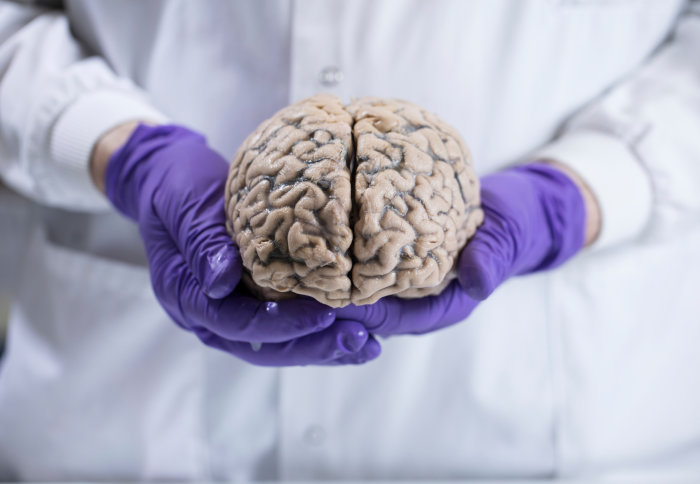Behind the scenes at the Parkinson’s UK Brain Bank
by Ellyw Evans

The Brain Bank is home to over 1,000 donated brains that are helping to find new insights in the search for better treatments for Parkinson's disease.
The Parkinson's UK Brain Bank, part of the Multiple Sclerosis and Parkinson’s Tissue Bank based at Imperial's Hammersmith Campus, collects tissue from people with and without Parkinson's disease who have generously chosen to donate their brains to research.
Having access to brain tissue is vital for scientists as complex brain and spinal cord conditions – such as Parkinson’s and multiple sclerosis (MS) – are relatively unique to humans and difficult to study in animals. The tissue is supplied to researchers all over the world studying Parkinson's, multiple sclerosis and related conditions.
Here we take a look behind the scenes to shine a spotlight on the brains that are powering research
In 1998 Professor Richard Reynolds who leads the MS arm of the Tissue Bank personally collected the first donation. Since then, the Multiple Sclerosis and Parkinson’s Tissue Bank has received a growing number of donations every year.
Deciding to leave your brain and spinal cord for research is not an easy decision to make. A team of coordinators are on hand to help individuals make an informed decision on whether to become a donor. The team also emphasise the importance of the donor's family knowing of their decision so that they can help ensure their wishes are carried out.
When a donor dies, the Tissue Bank team will work with the donor’s next of kin, medical professionals, funeral directors and mortuaries to organise the tissues to be removed in a careful manner at a local hospital.
It's important that the tissue is collected within 24 hours but they can accept tissue up to 48 hours after death. Tissue collected within 24 hours means that most of the important contents of brains cells (such as mRNA and neurotransmitters) are preserved and is the best quality for research studies.
After carefully weighing and examining the brain, the team will cut the brain in half. One half is preserved either by freezing or immersing in a fixative solution. This all has to be completed as soon as possible after death as brain tissue rapidly deteriorates after death. This is used for diagnostic examination to see what neuropathological signs of dementia the donor had and the process can take up to six weeks to complete.
The other half is used to prepare tissue samples for researchers to study. One brain provides around 250 samples which means it can be used in a large number of different research projects. Preparation time for research studies varies depending on the complexity. This can be anything from giving a specific block of tissue, microdissection of an anatomical area to creating translucent 3D blocks of tissue.
Studying human brain tissue that is donated for research is still one of the most important ways we can study Parkinson’s and related conditions. The Tissue Bank receives hundreds of request every year for tissue samples to supply UK and international research studies whose work is helping to find clues about this complex condition, opening new avenues for treatment.
Each application is reviewed by a governing body to ensure that the research is both a good and ethical use of tissue.
All this work wouldn't be possible without the people behind the Tissue Bank. From helping donors make an informed decision to preparing tissue samples, each member of the Tissue Bank team plays a valuable part in advancing research.
Becoming a brain donor
You can find how to become a donor and browse frequently asked questions at the MS Parkinson’s Tissue Bank website.
You can also contact the team directly via:
+44 (0) 20 7594 9732
The work of the Tissue Bank is supported by Parkinson’s UK and the Multiple Sclerosis Society of Great Britain and Northern Ireland in partnership with Imperial College London
Article text (excluding photos or graphics) © Imperial College London.
Photos and graphics subject to third party copyright used with permission or © Imperial College London.
Reporter
Ellyw Evans
Faculty of Medicine Centre